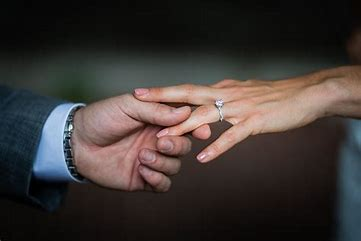When is it appropriate for a marriage to be proposed? How long should a couple date before getting married?
How long should a person wait before "popping the question"?
According to Elizabeth Earnshaw, LMFT, a licensed marriage therapist, time does matter. She constructed a study of 3,000 married couples and found that those who waited at least a year drastically increased the odds of a successful marriage. The couples who dated for one to two years before getting engaged were 20 percent less likely to get divorced than those who got engaged in less than a year. Furthermore, couples who had been together for three or more years before getting engaged were nearly 50 percent less likely to get divorced. The honeymoon phase can last anywhere from about three months to a year. Earnshaw suggests that couples move out of the honeymoon phase before getting engaged, so "they are going in with eyes wide open."
In a reading from Insider titled, "How long you should date before getting engaged, according to therapists", they list multiple specific physiological changes that happen when a person experiences new romance that could blind them to relationship red flags. What are those red flags a person should look out for when dating? Well, the first one to consider is that new romances can often make someone confuse lust and love because of hormone changes. With that feeling of new excitement when an individual begins dating another, along comes a great increase of a hormone that increases the feeling of happiness. Many are familiar with this hormone, called dopamine. That giddy feeling soon passes over, and as their hormone levels stabilize, their experience of that "love" will change as well. In addition, being "in love" within the first few months can be a misconception because people typically only present themselves with the "best" traits and acts, and not their true, everyday selves. It usually isn't anywhere close to how someone would really behave or perform a year or several more down the road. Humans like to give off the best first impressions of ourselves, and then slowly resolve to our usual habits. Seeing through foggy glasses like this can lead to a divorce.
Taking the time to ask yourself certain questions can help examine motivations for proposing and concluding if the timing is right for marriage. The Regain Editorial Team provides the following "The Ultimate Marriage Checklist":
What is the reason for engagement?
Can life be imagined without this partner?
Is there a likeness of both families to each other?
Are similar values shared?
Are conflicts resolved in a healthy manner?
Are they sexually compatible with one another?
Do individuals live similarly? For example, is one neat, and one messy? Is there control and order?
These questions are valid when considering or before proposing marriage because they become lifetime pursuits and adaptations. Trying to resolve these issues can cause a rough few months of beginning a lifelong companionship. With these questions in mind, it is very possible to avoid a divorce or falling marriage. If a couple is able to answer these questions with confidence and agreement, then the timing may just be perfect!
In conclusion, saying "I do," and locking in a relationship with another individual is not an easy choice, then reconsider the pace of the engagement and where the relationship is going. A few concerns are normal when getting married, but if patterns of disrespect and certain behaviors are continuing, science shows it doesn't get better in a marriage. People often relax and no longer feel the need to "impress" once they are married. go into a marriage with open eyes, realistic expectations, and a willingness to compromise.





Comments
Post a Comment